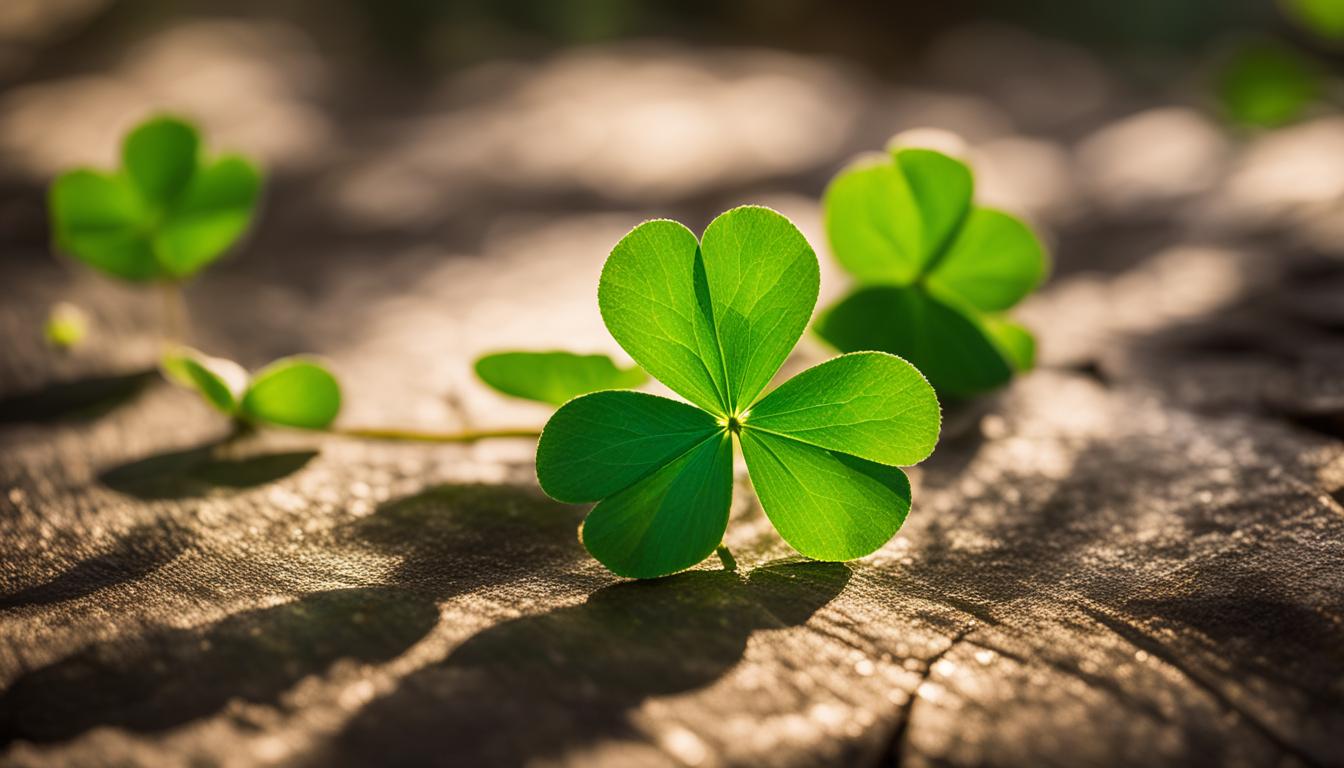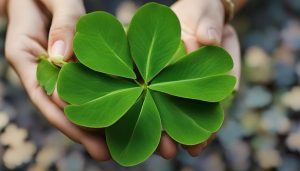Are you curious about the superstitions surrounding four-leaf clovers? Wondering if it’s truly good luck to eat one? Let’s delve into the symbolism and beliefs surrounding these lucky charms.
The four-leaf clover has long been associated with luck and superstitions. According to one legend, Eve plucked a four-leaf clover as a memento from the Garden of Eden, linking its luck factor to religious significance. The Celts believed that finding a four-leaf clover granted magical powers, safeguarding against evil and even granting the ability to see fairies. The connection between clovers and luck is also tied to St. Patrick’s Day, where shamrocks are used to represent the Holy Trinity, with the four-leaf clover distinguished by its extra leaf.
But just how rare are four-leaf clovers? The odds of finding one are approximately 1 in 10,000, with the genetic mutation for extra leaves occurring in white clovers. Swiss researchers discovered that the likelihood of finding a four-leaf clover was one in 5,076 three-leafed clovers. These unique clovers are truly a treasure to stumble upon.
Contents
- 1 The Significance of Four-Leaf Clovers in History and Folklore
- 2 The Hunt for Four-Leaf Clovers
- 3 Exploring the Belief in the Luck of Four-Leaf Clovers
- 4 Conclusion
- 5 FAQ
- 5.1 Is it good luck to eat a 4 leaf clover?
- 5.2 What are some common lucky charms?
- 5.3 What is the symbolism of clovers?
- 5.4 Why are four-leaf clovers considered lucky?
- 5.5 How can I find a four-leaf clover?
- 5.6 Are four-leaf clovers really that rare?
- 5.7 Why do people believe in the luck of four-leaf clovers?
- 5.8 Are four-leaf clovers lucky in all cultures?
- 5.9 Can I create my own luck with a four-leaf clover?
- 5.10 Are there any other lucky symbols besides four-leaf clovers?
- 6 Source Links
Key Takeaways:
- Eating a four-leaf clover is not typically associated with good luck, rather it is considered a lucky symbol.
- Four-leaf clovers have a rich history of magical associations and are believed to provide protection.
- Finding a four-leaf clover is rare, with odds of approximately 1 in 10,000.
- These clovers are connected to St. Patrick’s Day and the symbolism of the Holy Trinity.
- Regardless of their luck, four-leaf clovers continue to captivate our imaginations and symbolize hope and good fortune.
The Significance of Four-Leaf Clovers in History and Folklore
Four-leaf clovers have a rich history and play a role in various cultures and traditions. In ancient Ireland, Celtic priests carried three-leaf clovers, or shamrocks, to ward off evil spirits. Four-leaf clovers were seen as charms offering protection and good luck. During the Middle Ages, children believed that carrying a four-leaf clover would enable them to see fairies. The leaves of a four-leaf clover symbolize faith, hope, love, and luck. It is often said that Ireland is home to more four-leaf clovers than any other place, giving rise to the phrase “the luck of the Irish.” Four-leaf clovers are sought after for their rarity and considered lucky symbols in many cultures.
In addition to Ireland, four-leaf clovers hold significance in other parts of the world as well. In Sweden, they are associated with love and are often given as tokens of affection. In China, four-leaf clovers represent good luck and are often displayed in homes and businesses. In some Native American cultures, the four-leaf clover is believed to bring harmony and balance.
Good Luck Rituals and Traditions
Throughout history, people have developed various rituals and traditions involving four-leaf clovers to attract good luck. One popular belief is that carrying a four-leaf clover in your pocket or wearing it as jewelry can bring good fortune. Some cultures even believe that finding a four-leaf clover grants you a wish. These rituals and traditions highlight the enduring belief in the luck associated with four-leaf clovers.
“Finding a four-leaf clover grants you a wish.”
To this day, many people continue to search for four-leaf clovers in the hope of finding luck. It has become a beloved pastime, especially during St. Patrick’s Day celebrations, when the quest for four-leaf clovers takes on special significance. Whether as a symbol of hope, protection, or simply a stroke of good fortune, four-leaf clovers continue to captivate and inspire people worldwide.
| Country/Region | Symbolism |
|---|---|
| Ireland | Luck of the Irish |
| Sweden | Love and affection |
| China | Good luck and prosperity |
| Native American | Harmony and balance |
The Hunt for Four-Leaf Clovers
If you’ve ever wondered how to find a four-leaf clover, you’re not alone. The rarity of these lucky charms has made them a sought-after symbol of good fortune. While they may be hard to find, with a few tips and a keen eye, you just might be able to uncover one of these elusive treasures.
To begin your search, head to a patch of clover. These patches are usually large and attractive to honeybees, making them a natural hotspot for four-leaf clovers. Start by scanning the area while the sun is still up. Clovers tend to fold up their leaves about an hour before sunset, so it’s best to search during daylight hours.
When looking for a four-leaf clover, it’s important to relax your eyes and let them adjust to the pattern of the leaves. Four-leaf clovers have a distinctive shape, with a smaller leaf branching out from the typical three-leaf clover pattern. By training your eyes to recognize this shape, you increase your chances of spotting a lucky find.
It’s worth noting that finding one four-leaf clover often means that more can be found nearby. This is due to the genetic mutation responsible for the extra leaves. So, if you come across a four-leaf clover, be sure to carefully examine the surrounding area for more hidden treasures. While four-leaf clovers may be rare, they are not as scarce as commonly believed.
| Table: Common Myths about Four-Leaf Clovers |
|---|
| Myth 1: Four-leaf clovers are incredibly rare. |
| Fact: While they are not as common as three-leaf clovers, four-leaf clovers can be found with some patience and a little luck. |
| Myth 2: Four-leaf clovers are the only lucky clovers. |
| Fact: Five-leafed and six-leafed clovers also exist, each with their own unique symbolism and luck. |
| Myth 3: Finding a four-leaf clover guarantees good luck. |
| Fact: While finding a four-leaf clover is considered lucky, the concept of luck is subjective and can manifest differently for each individual. |
So, whether you’re on the hunt for a four-leaf clover for the belief in its luck or simply to marvel at its rarity, take your time, enjoy the process, and who knows, you just might stumble upon a little extra luck in the form of a four-leaf clover.
Exploring the Belief in the Luck of Four-Leaf Clovers
The belief in the luck of four-leaf clovers is deeply ingrained in our cultural and historical beliefs. The rarity and magical associations of these unique symbols have captivated people’s imagination for centuries. It is a belief rooted in magical thinking, where connections are made and conclusions drawn despite the lack of empirical evidence.
Magical thinking allows individuals to hold onto certain beliefs that bring joy and hope. The idea of finding a four-leaf clover and receiving good luck is a comforting thought that can uplift one’s spirits. Whether it is the excitement of stumbling upon a rare treasure or the sense of connection to ancient folklore, the belief in the luck of four-leaf clovers holds a special place in our hearts.
“Finding a four-leaf clover is like stumbling upon a little piece of magic. It fills you with a sense of wonder and reminds you that there is still room for unexpected miracles in this world.” – Unknown
The symbolic power of four-leaf clovers lies in their association with luck and fortune. It is a belief that transcends cultural boundaries and is embraced by people from all walks of life. Whether you are a believer or not, the allure of these elusive charms continues to inspire hope and curiosity as people search for that coveted symbol of good fortune.

The Magic of Belief
The belief in the luck of four-leaf clovers is a testament to the human capacity for magical thinking. It is a reminder that sometimes, it is the intangible and unexplainable that brings us the most joy and wonder. So, the next time you come across a four-leaf clover, take a moment to embrace the belief in its luck and let it fill your heart with hope.
Conclusion
In conclusion, the truth about four-leaf clovers is that they are considered lucky due to their rarity and the deep-rooted cultural and historical associations of luck and good fortune. From Celtic traditions to St. Patrick’s Day celebrations, four-leaf clovers hold special significance in various cultures. However, it’s important to remember that luck is subjective and can manifest differently for each individual.
While four-leaf clovers have been associated with superstitions and beliefs, it’s essential to debunk any misconceptions surrounding their magical powers. The belief in luck is often intertwined with magical thinking, which allows individuals to hold onto certain beliefs that bring joy and hope. Whether you choose to believe in the luck of a four-leaf clover or view it as a symbol of hope and magical thinking, the search for these elusive charms continues to captivate and intrigue people around the world.
So next time you come across a four-leaf clover, remember that it’s not simply about luck, but rather the beauty of nature and the joy of finding something rare. Embrace the wonder and enjoy the moment, knowing that whether or not it brings you luck, it has already brought a smile to your face.
FAQ
Is it good luck to eat a 4 leaf clover?
No, the luck associated with four-leaf clovers comes from finding and possessing them, not from consuming them.
What are some common lucky charms?
Some common lucky charms include horseshoes, rabbit’s feet, and four-leaf clovers.
What is the symbolism of clovers?
Clovers are often associated with luck, with each leaf representing hope, faith, love, and luck.
Why are four-leaf clovers considered lucky?
Four-leaf clovers are considered lucky due to their rarity and historical associations with good fortune and protective powers.
How can I find a four-leaf clover?
To find a four-leaf clover, search in clover patches, relax your eyes, and look for the distinctive shape. Remember that finding one often means there are more nearby.
Are four-leaf clovers really that rare?
Four-leaf clovers are rare compared to their three-leaf counterparts, but they are not as scarce as commonly believed. The genetic mutation that causes extra leaves also leads to the possibility of five-leafed and six-leafed clovers.
Why do people believe in the luck of four-leaf clovers?
Belief in the luck of four-leaf clovers is often rooted in cultural and historical traditions, as well as the allure of finding something rare and special.
Are four-leaf clovers lucky in all cultures?
While four-leaf clovers are particularly associated with luck in Irish and Celtic traditions, they are valued symbols of good fortune in many cultures around the world.
Can I create my own luck with a four-leaf clover?
Luck is subjective and can manifest differently for each individual. Finding a four-leaf clover might bring you joy and hope, but ultimately, luck is what you make of it.
Are there any other lucky symbols besides four-leaf clovers?
Yes, there are many other symbols considered lucky in different cultures, such as lucky coins, lucky numbers, and lucky animals.





